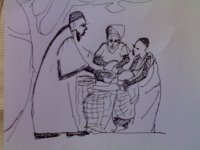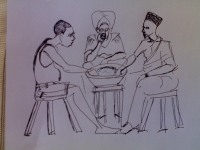March 2009
 Walya ékongyé tù kone m’moka. (Bembe)
Walya ékongyé tù kone m’moka. (Bembe)
Ne rompez jamais la fraternité à cause de la bonne moisson du maïs. (French)
Uvunapo mahindi, chunga usi haribu undugu. (Swahili)
If you get a fine harvest of maize don’t break your local brotherhood and sisterhood. (English)
Background, Explanation, Meaning and Everyday Use
Known as great farmers, hunters and fisher people among Bantus in Central Africa, the Bembe people consider that a good harvest is wealth and power. For them a good harvest depends not only on the season and the type of soil where the farm is located, but also on the size of the farm that a strong person can manage to maintain. They believe that 50 square meters is for a single person and 100 square meters for a husband and wife. Since polygamy is still a challenge, 200 square meters and above could be seen sufficient for a man with more than one wife.
Remember that traditionally no machinery is involved. Everything was done by hand by the immediate family. During harvest time people would welcome close friends and families to help them harvest. The elderly, widows and strangers in the society could come without any invitation especially in case of a large farm and a farm that is not far from the village. But due to selfishness some farm owners were rude and abusive. Some even mistreated these weak beggars by taking away everything they had collected for the simple reason that nobody had helped them when they were struggling along working only with their wives. Yet such behavior was not welcomed in this DRC community where everyone has a right to eat and sharing is a must. They forget that very soon the harvest period will be over, and one day they may need support from other people for an event such as a wedding, death or birth.
Biblical Parallels
“But a certain beggar named Lazarus used to be at his gate, full of ulcers” (Luke 16:20).
“At that time she went off and entered and began to glean in the field behind the harvesters” (Ruth 2:3).
Contemporary Use and Religious Application
 This Bembe proverb can be applied especially to the current world food crisis that not only widens the gap between the rich and poor, but also creates a conflict between these two groups and their leaders. For example, in the year 2008 many economically rich countries imposed sanctions on Zimbabwe including stopping food aid and other humanitarian assistance to Zimbabwe’s regime. They forgot that the president himself cannot be affected by these sanctions. It is the poor citizens who suffer. The outcome was that thousands of Zimbabweans went to bed without food and others died from cholera.
This Bembe proverb can be applied especially to the current world food crisis that not only widens the gap between the rich and poor, but also creates a conflict between these two groups and their leaders. For example, in the year 2008 many economically rich countries imposed sanctions on Zimbabwe including stopping food aid and other humanitarian assistance to Zimbabwe’s regime. They forgot that the president himself cannot be affected by these sanctions. It is the poor citizens who suffer. The outcome was that thousands of Zimbabweans went to bed without food and others died from cholera.
In mid February 2009, the Kenyan parliament rejected a censure motion bill against the Kenya Agriculture Minister. There were allegations that he was involved in a subsidized maize scandal that denied food to millions of Kenyans. Like the selfish farmers in the Bembe proverb, world leaders and humanitarians must learn to share everything including food as it is advised in Luke 6:30: “Give to everyone asking you.”
Mr. Allan Babunga
P.O. Box 3253
00200 Nairobi, Kenya
Cellphone: 0721-749795
Email: alainidya@yahoo.fr
Illustrations provided by:
Professor Cephas Yao Agbemenu
Department of Fine Arts
Kenyatta University
P.O. Box 43844
Nairobi, Kenya
Cellphone: 254-723-307992
Email: cyagbemenu@yahoo.com

